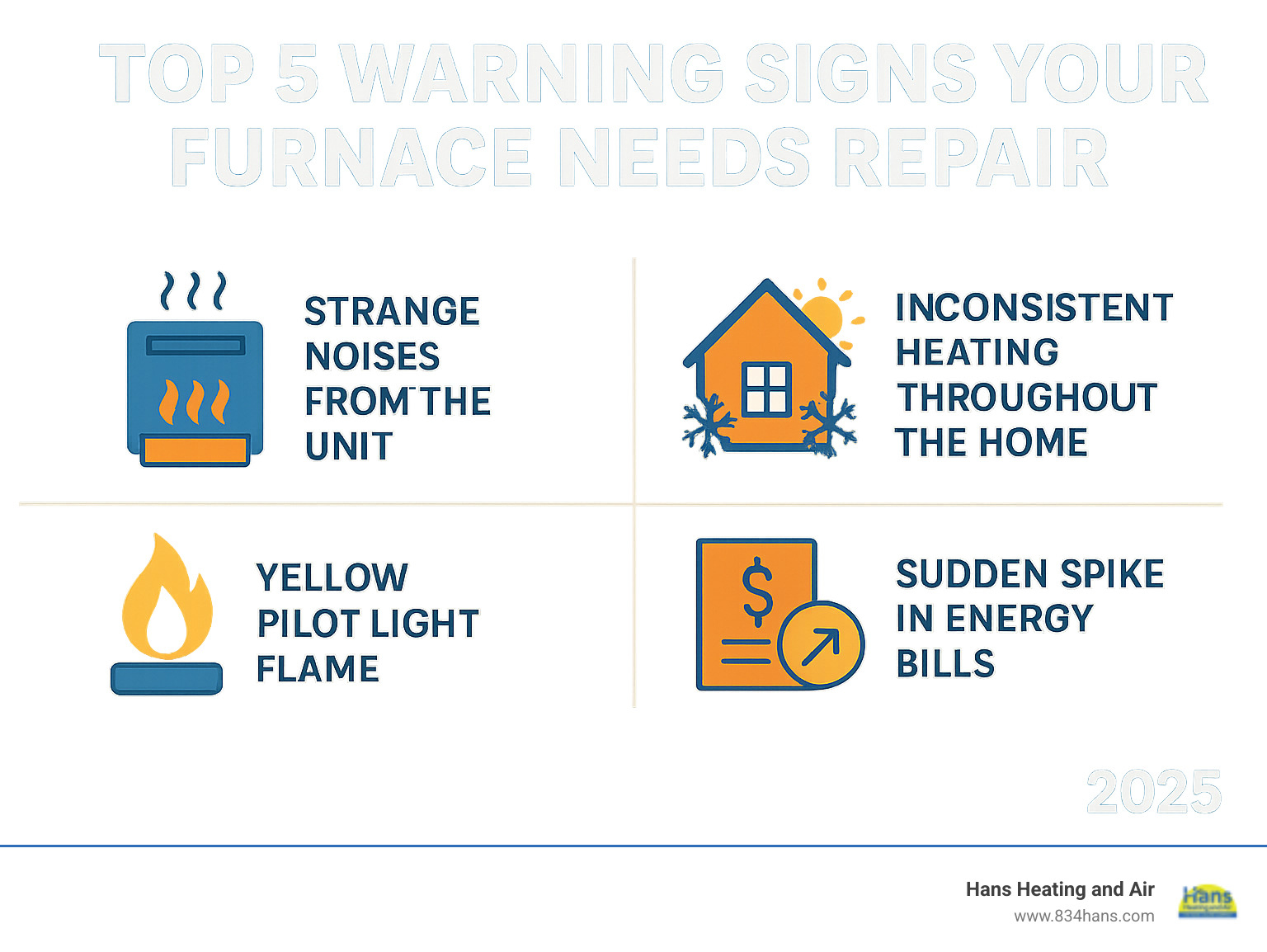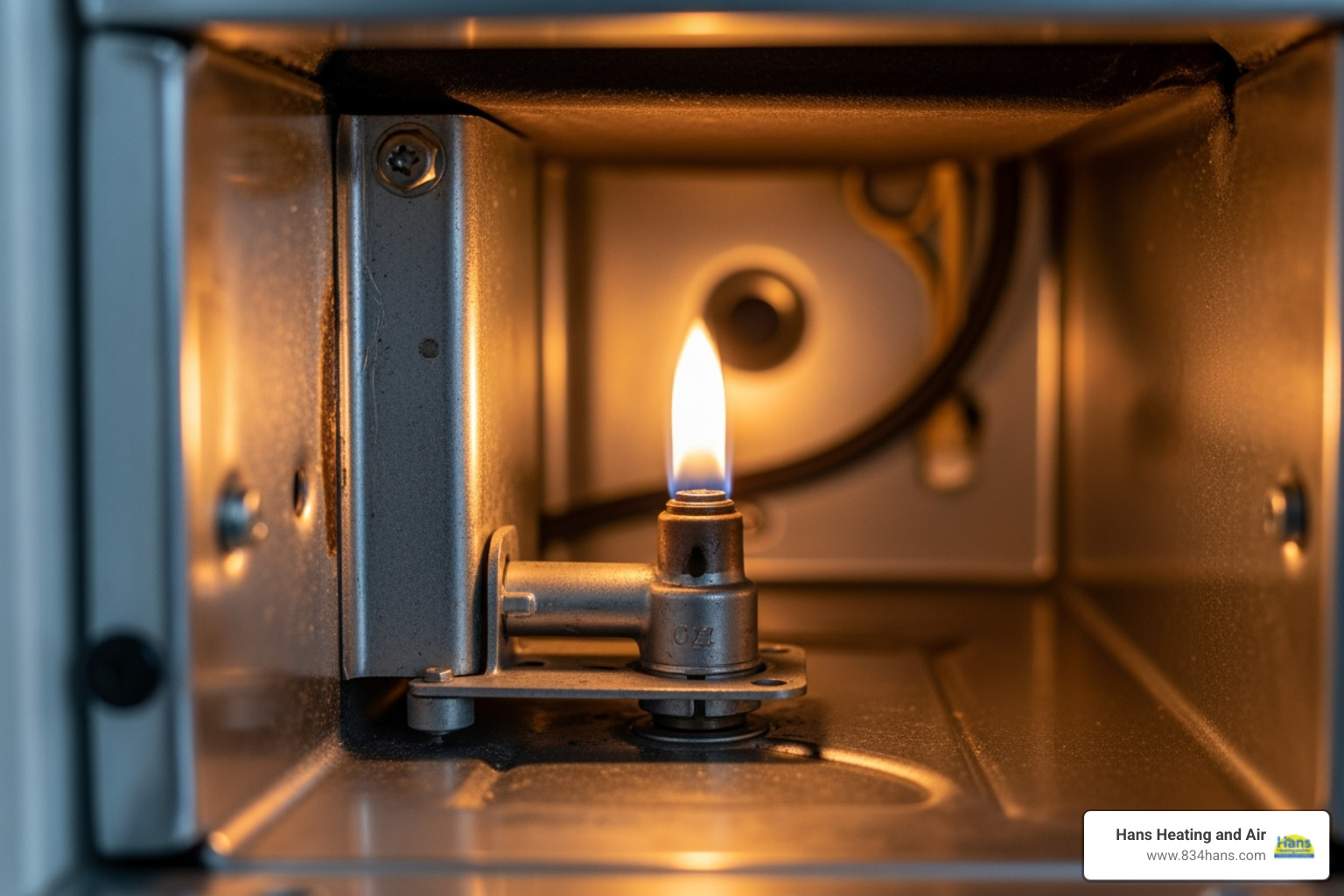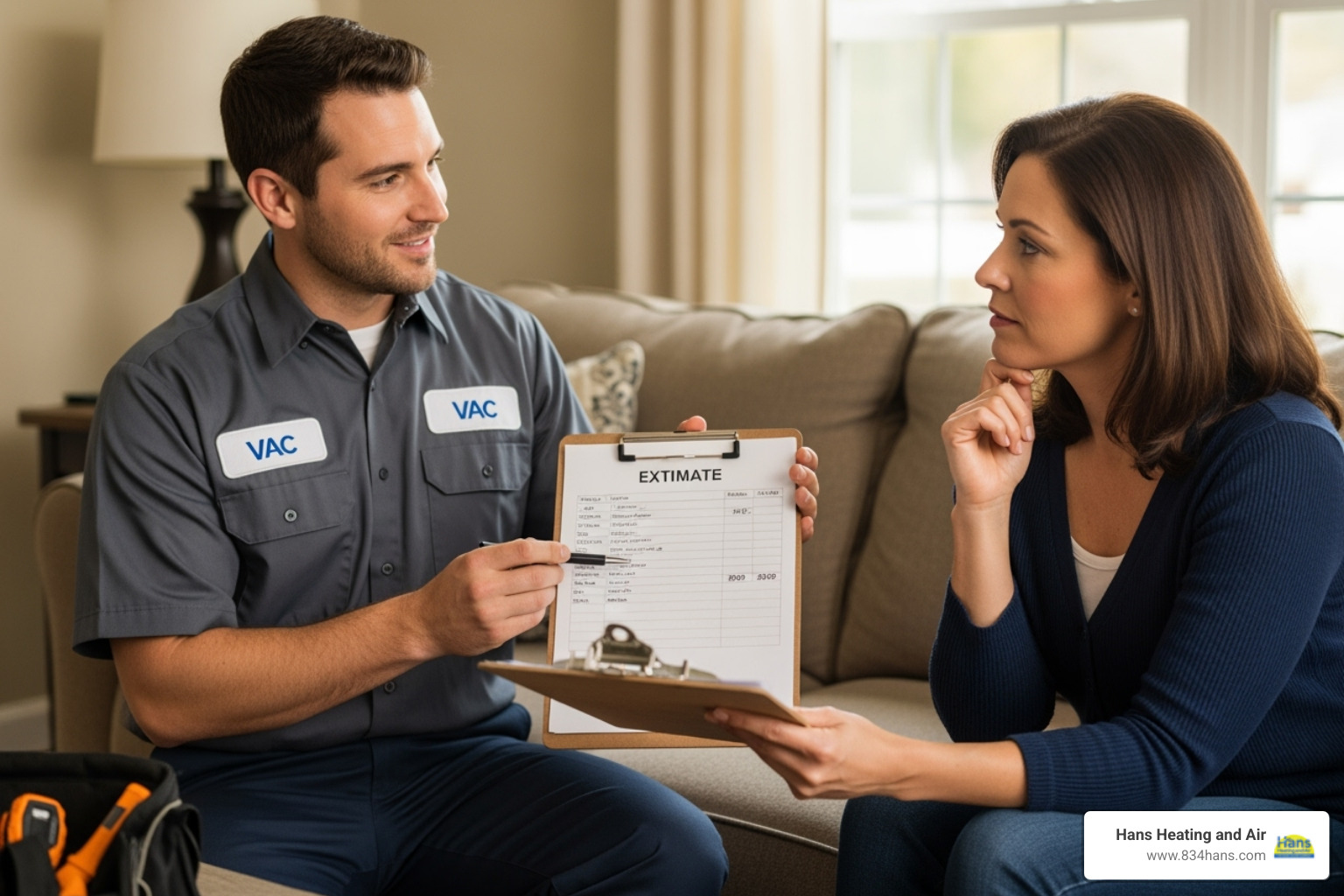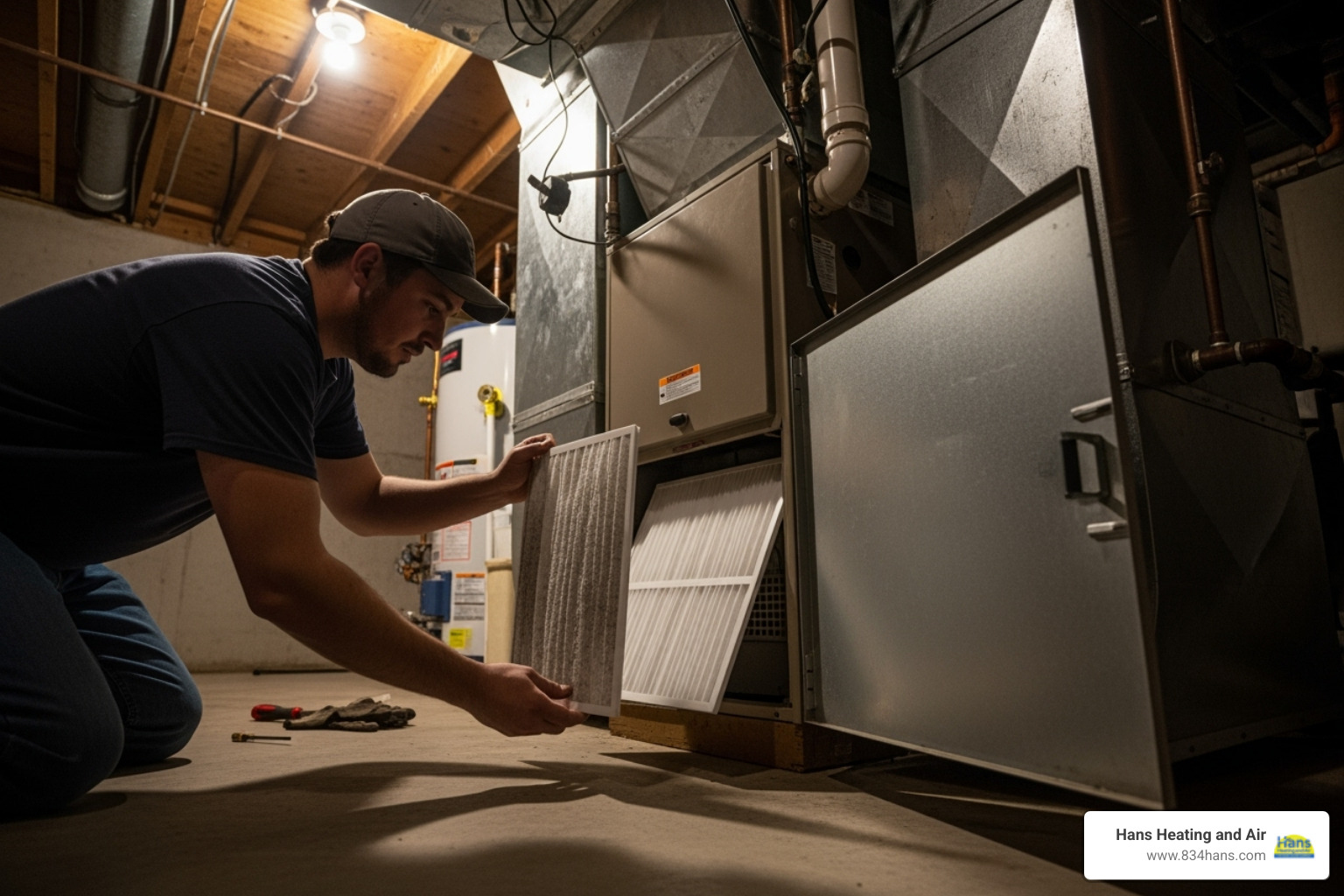Local Furnace Repair: Connecting You with Top HVAC Dealers
Why Finding Local Furnace Repair Matters for Your Home Comfort
When your furnace repair near me search becomes urgent on a cold winter night, you need fast answers and reliable help. Here's what you need to know right away:
Quick Action Steps for Furnace Problems:
- Check your thermostat - Ensure it's set to "heat" and batteries aren't dead
- Inspect your circuit breaker - Look for tripped switches
- Replace your air filter if it's dirty or clogged
- Call a professional for gas smells, no heat, or strange noises
- Get multiple quotes from licensed, insured technicians
Your furnace is the heart of your home's comfort system. When it breaks down during harsh winter months, a fast repair is essential. Most furnaces can work properly for 15 to 30 years with regular maintenance, but even well-maintained systems can experience unexpected failures.
The good news is that most furnace problems are fixable. The average cost of HVAC repairs is around $350, with simple fixes like capacitor replacement ranging from $100 to $500. More complex repairs, such as compressor issues, can cost between $750 to $2,000.
Finding the right repair technician quickly is crucial. You want someone who arrives promptly, diagnoses the problem accurately, and fixes it right the first time. Licensed professionals typically charge between $50 and $150 per hour, while inspections range from $150 to $500.

Recognizing the Red Flags: When Your Furnace Needs Attention
Your furnace often gives warning signs before a complete breakdown. Recognizing them early can save you from a cold night without heat.
- Strange noises: Banging, squealing, or grinding sounds are not normal. Banging can indicate loose parts, squealing often points to belt or motor bearing issues, and grinding suggests a struggling blower motor. These noises usually worsen over time.
- Insufficient heat: If some rooms are cold while others are cozy, you may have a struggling blower motor, clogged air pathways, or ductwork problems.
- High energy bills: A sudden spike in your utility bills means your furnace is working harder than it should, likely due to an internal issue reducing its efficiency.
- Thermostat issues: If your system cycles on and off frequently, runs constantly, or won't start, the thermostat could be the problem. It might be a simple fix like dead batteries or a sign of deeper electrical issues.
- Poor air quality: An increase in dust, dry air, or strange odors can trace back to your furnace. A musty smell might indicate moisture, while other odors could signal more serious concerns.
- Ignition problems: For gas furnaces, a yellow pilot light instead of a crisp blue one indicates incomplete combustion, a potential safety hazard that could lead to carbon monoxide issues.
- Mechanical wear: As a system ages, components naturally wear out, leading to decreased efficiency and increased noise.

Common Causes of Furnace Breakdowns
Understanding what typically goes wrong can help you communicate more effectively with technicians.
- Dirty filters: A clogged air filter restricts airflow, forcing the system to work overtime. This can lead to overheating, reduced efficiency, and component failure.
- Thermostat malfunctions: A faulty thermostat can't properly signal your furnace, leading to comfort issues even if the furnace itself is healthy.
- Cracked heat exchanger: This is a serious problem in gas furnaces, as it can leak dangerous, odorless carbon monoxide into your home. Regular professional inspections are crucial for safety.
- Blower motor failure: A broken blower motor means heated air can't circulate through your home, leaving you in the cold.
- Clogged condensate drains: In high-efficiency furnaces, a blocked drain line can trigger a safety switch that shuts down the system to prevent water damage.
- Lack of maintenance: Neglecting annual professional tune-ups is the biggest culprit behind many furnace problems. Small issues grow into expensive repairs, efficiency drops, and the system's lifespan shortens.
The "Repair vs. Replace" Dilemma: Making a Cost-Effective Choice
When your furnace breaks, you face a tough choice: repair or replace? The decision impacts your finances both now and in the future.
Furnace lifespan is a key factor. Most furnaces last 15 to 30 years. If your system is approaching or has passed the 15-year mark, frequent calls for furnace repair near me may signal it's time for a replacement.
Consider these factors when weighing your options:
- Energy efficiency: Older furnaces often have low AFUE ratings (Annual Fuel Utilization Efficiency) of 60-70%, meaning up to 40% of the energy is wasted. Modern high-efficiency models operate at 90-98% AFUE, saving you money on winter heating bills.
- Frequent breakdowns: If you're constantly calling for repairs, the cumulative cost and inconvenience can quickly outweigh the price of a new, reliable unit.
- Rising utility costs: If your heating bills are climbing without a change in your habits, your aging furnace is likely losing efficiency and working harder to do the same job.
| Feature | Repairing an Old Furnace | Installing a New Furnace |
|---|---|---|
| Initial Cost | Lower upfront investment | Higher upfront investment |
| Longevity | Extends life for a limited period; future breakdowns likely | Provides 15-30 years of reliable heating |
| Efficiency | Remains at existing, often lower, efficiency | Significantly higher AFUE, leading to lower energy bills |
| Reliability | Decreases over time; unpredictable performance | High reliability, consistent performance |
| Comfort | May struggle to provide consistent comfort | Superior comfort with even heating and better temperature control |
| Warranty | Repair warranty; no system warranty | Full system warranty on parts and labor |
| Technology | Lacks modern features like smart thermostats | Access to advanced features for improved comfort and control |
| Safety | Older units may have higher safety risks | Built to modern safety standards |
The general rule of thumb? If a repair costs more than half the price of a new system, and your furnace is old, replacement is usually the better long-term investment.
How Maintenance Affects Your Furnace's Lifespan
Regular maintenance is key to maximizing your furnace's lifespan and performance. Annual professional tune-ups are essential. During these visits, technicians inspect, clean, and calibrate components, catching small issues like loose connections or dirty burners before they become major, costly problems. A well-maintained furnace can easily reach the upper end of its 15-30 year lifespan, while a neglected one may fail much sooner. Consistent care ensures your system runs efficiently, provides even heating, and keeps your energy bills predictable.
Understanding the Costs and Finding a Trustworthy "Furnace Repair Near Me"
When your furnace fails, you need to know the potential cost and who to trust for the repair. Furnace repair costs vary depending on the issue.

What is the Average Cost of Furnace Repair?
While the average HVAC repair cost is around $350, this is just a baseline.
- Capacitor replacement, a common fix for startup issues, typically costs between $100 and $500.
- Compressor repairs are more significant, ranging from $750 to $2,000, and may indicate larger system problems.
Several factors influence the final price, including the type of repair, the time of day (emergency calls after hours cost more), and your furnace model (parts for older or uncommon units can be more expensive). Most contractors charge between $50 and $150 per hour or offer flat-rate pricing for specific services. Always get a detailed, written estimate before work begins.
How to Find a Qualified Technician for Furnace Repair Near You
Finding a reliable technician for furnace repair near me in Central Alabama is crucial.
- Online reviews and local recommendations: Check what neighbors and other customers say about their experiences. Look for consistent praise regarding communication, cleanliness, and fair pricing.
- Verifying credentials: Ensure any technician you hire is properly licensed and insured. This is essential for your protection.
- NATE certification: North American Technician Excellence (NATE) certification is a mark of a highly skilled professional who has passed rigorous testing.
- Factory training: While not required, technicians trained on specific brands may diagnose issues with your model more quickly.
What to Ask Before Hiring a Furnace Repair Company
Before hiring, ask these key questions:
- Experience: How long has the company been in business? What training do technicians have?
- Licensing and Insurance: Can you provide proof of current licensing and insurance?
- Written Estimates: Do you provide detailed, written estimates before starting work?
- Warranty Coverage: What kind of warranty do you offer on parts and labor?
- Emergency Availability: Do you offer 24/7 or after-hours emergency service?
- Background Checks: Do you perform background checks on your technicians?
- Customer Satisfaction: How do you ensure customer satisfaction and handle complaints?
Proactive Care: DIY Maintenance and Emergency Preparedness
While major repairs require a professional, simple DIY maintenance can keep your furnace running smoothly and prevent emergency calls for "furnace repair near me". A little prevention goes a long way.

Essential DIY Maintenance to Prevent Furnace Issues
- Change your air filters: This is the most important DIY task. A clogged filter restricts airflow, stressing your system. Change filters every 1-3 months, or more often if you have pets.
- Clean vents and registers: Ensure furniture, rugs, and curtains are not blocking air vents. Clear pathways allow for even heating and reduce strain on your furnace.
- Check your thermostat batteries: Dead batteries are a common reason a furnace won't turn on. Check them annually before the heating season begins.
- Keep the area around your furnace clear: Maintain at least two feet of clear space around the unit for proper airflow and safety. This also gives technicians easy access for service.
These steps supplement, but do not replace, an annual professional tune-up.
What to Do in a Furnace Emergency
Stay calm and follow these steps if your furnace acts up.
- If you smell gas: This is a serious emergency. Evacuate everyone from the house immediately. Do not use any phones or electrical devices. Once safely outside, call your gas company and 911.
- If the furnace won't turn on: Check your electrical panel for a tripped circuit breaker. If it trips again after resetting, call a professional.
- Double-check your thermostat: Make sure it's set to "heat" and the temperature is set higher than the current room temperature.
- For major mechanical problems: If you hear grinding noises or smell something burning, turn the furnace off at the thermostat and the main power switch.
- Know when to call a professional: For any issue beyond basic troubleshooting or if you have safety concerns, call for help. Our team handles emergency furnace repairs around the clock, so you won't be left in the cold for long.
Frequently Asked Questions about Furnace Services
Here are answers to the most common questions we receive about furnace repair near me and other services.
Are there cheaper times of year for furnace repair or replacement?
Yes. The best time for furnace service is during the "shoulder seasons" of spring and fall. Demand is lower, so you can often get faster service and may find promotional pricing. Scheduling work during these milder months allows you to make a planned decision rather than a panicked one in extreme weather.
How long do furnaces typically last?
Most furnaces have an average lifespan of 15 to 30 years.
- Gas furnace lifespan: Typically 20-30 years with proper care.
- Electric furnace lifespan: Usually around 15-20 years.
The single biggest factor is maintenance. A furnace that receives annual tune-ups can easily reach its maximum expected lifespan, while a neglected one may fail in as little as 10 years. Signs of aging include uneven heating, rising energy bills, and more frequent repairs.
What qualifications should an HVAC technician have?
When someone works on your home's heating system, they must be qualified. Look for:
- State licensing: This is non-negotiable. It proves the technician has met legal requirements to perform HVAC work.
- Insurance: A reputable company will carry full insurance to protect you from liability in case of an accident.
- NATE (North American Technician Excellence) certification: This is the industry's gold standard. NATE-certified technicians have passed rigorous tests, proving their real-world knowledge and skills.
- EPA certification: This is important for technicians who handle refrigerants (found in heat pumps and AC units), ensuring they do so safely and in compliance with environmental regulations.
We make sure our team doesn't just meet these standards – we exceed them. Our technicians undergo continuous training to stay current with the latest technologies and best practices. After all, your comfort and safety are worth the extra effort.
Conclusion: Your Next Step for Reliable Furnace Repair
Dealing with a faulty furnace can be stressful, but understanding the basics of repair and maintenance puts you in control.
Here's a quick recap:
- Recognize warning signs early: Strange noises, high energy bills, or a yellow pilot light are calls for attention that can prevent a total breakdown.
- Make a smart repair vs. replace decision: Consider your furnace's age, efficiency, and repair frequency. A new unit can be a wise long-term investment.
- Understand the costs: Always get a written estimate. Costs vary, but a reputable company will be transparent about pricing.
- Find the right technician: Look for licensed, insured, and NATE-certified professionals in Central Alabama for reliable furnace repair near me.
- Accept proactive maintenance: Simple DIY tasks like changing filters, combined with annual professional tune-ups, are your best defense against breakdowns.
- Know emergency safety: If you smell gas, evacuate immediately and call for help. For other issues, try basic troubleshooting before calling a pro.
At Hans Heating and Air, we've built our reputation on high-quality, efficient, timely, and expert solutions because we understand that your home's comfort isn't just about temperature – it's about peace of mind. Whether you need routine maintenance or emergency repairs, our team treats every call with the urgency and care your family deserves.
Don't let another chilly night pass wondering if your furnace will keep working. Take control of your home's comfort today.
Other Services
Community Involvement

























